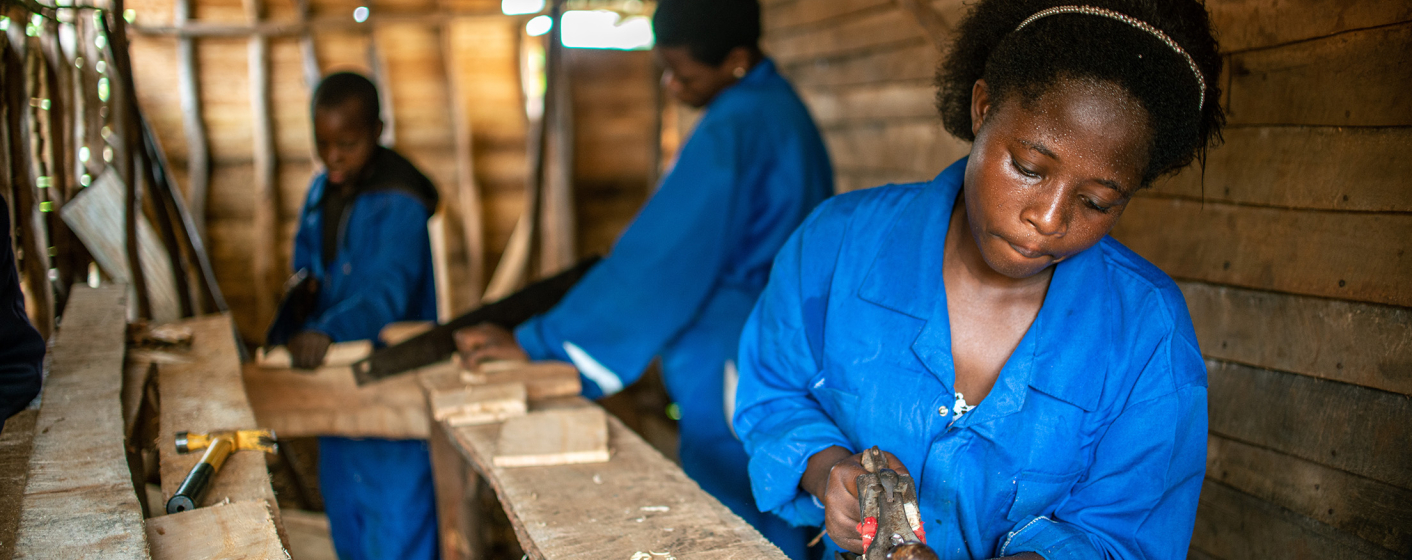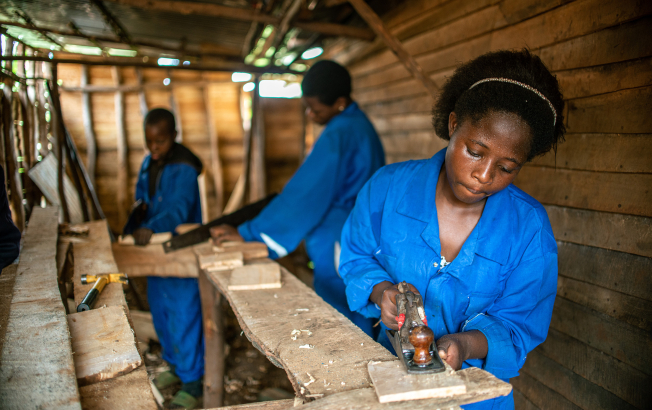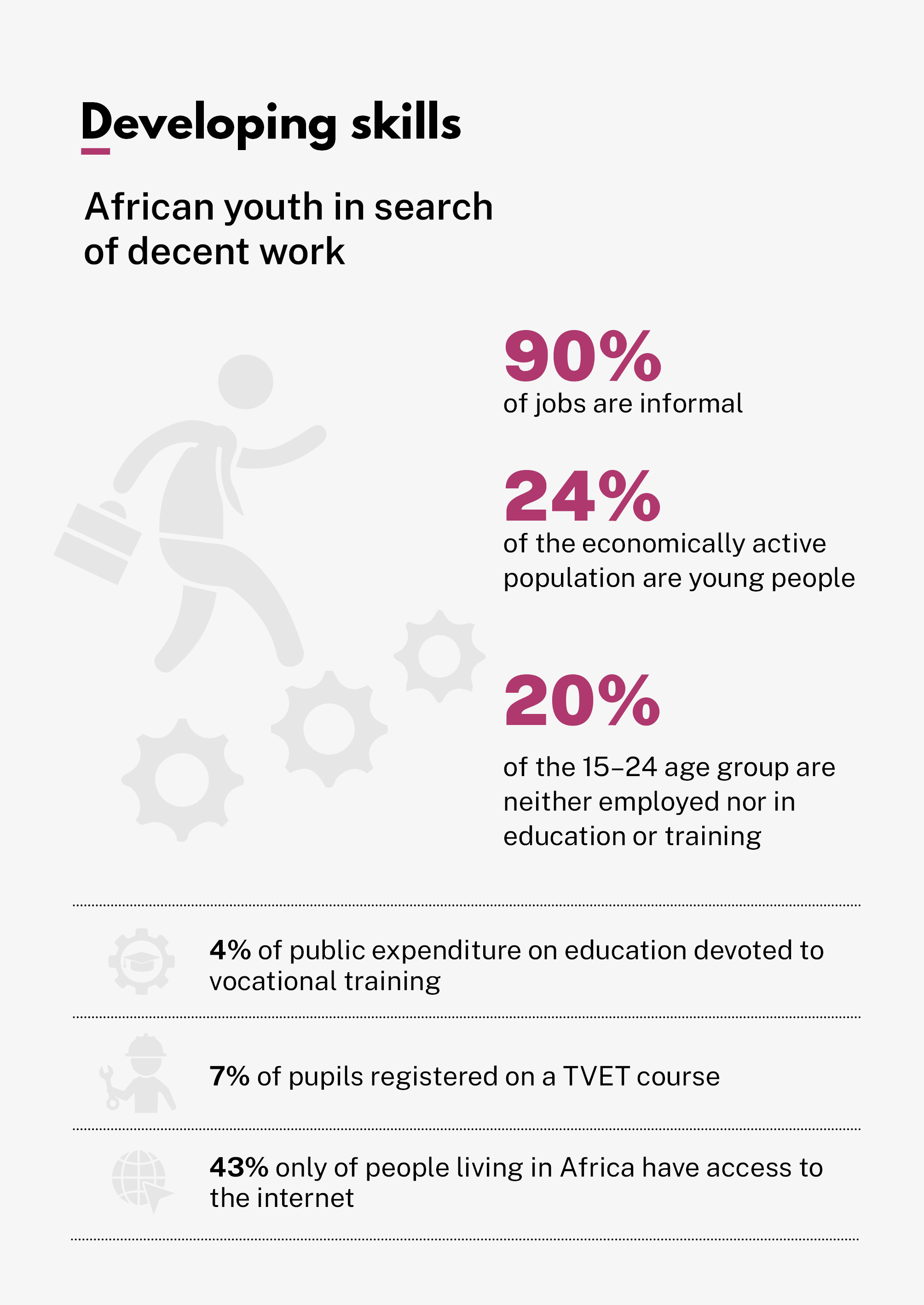Accessing TVET
1. Structuring informal vocational training
The informal economy is by far the largest provider of employment in Africa. For many of its actors, the challenge is not so much to ‘formalize’ informal vocational training, but rather to help in structuring and reinforcing it, with the aim of seeing their training recognized by the national authorities.
- In this context, support to the development of acquired experience validation mechanisms and certification recognition, as conducted recently with Mauritania by IIEP Dakar, addresses a significant need in all African countries.
- More broadly, the Institute promotes and supports the simplification and harmonization of skills certification systems at country level but also across countries on a regional level.
2. Guaranteeing TVET access and inclusion for vulnerable groups
The observation is unanimous: young urban men have much easier access to ‘formal’ vocational training in Africa than others. Enabling girls and women, rural populations, and internally displaced persons to have equitable access to TVET is a key issue. The same goes for the inclusion of people with disabilities in vocational training, which is still in the very early stages. To link the specific needs of these vulnerable groups to those of the labour market, planning that is sensitive to these issues is needed.
Youth employability
3. Strengthening the education > vocational training > employment continuum
In a context of very strong demographic pressure, access to the labour market remains a focus of government policies. This entails first and foremost quality basic education, the fundamental basis for accessing vocational training and, finally, employment. ‘To train as a plumber, a mechanic or even a high-level engineer, young people must first have basic reading, writing, and numeracy skills, and life skills’ underlines Koffi Segniagbeto, head of the IIEP-UNESCO Dakar office. Ensuring the continuum between education, vocational training, and employment is at the heart of IIEP-UNESCO Dakar’s work on TVET.
- The Institute contributes to establishing and developing lasting synergies between the different ministerial authorities concerned.
- The production of new knowledge on these issues is decisive for innovation and informing public policy.
- Finally, technical support to the development of information systems to anticipate and identify labour markets’ needs in terms of employment and skills addresses a strong demand from the countries and their partners.
4. Involving the private sector for the long term
TVET experts in Africa now seem to share the same conviction: mobilizing the private sector is no longer an option in order to strengthen TVET systems and sustainably develop youth employability. Private actors must be encouraged to make a concrete contribution to the strategic planning of the TVET sub-sector and to policy implementation.
At local level, that could entail the private sector making equipment and human resources available to promote the occupational integration of young people and align the training on offer with market realities.
- Developing, facilitating and federating public and private TVET networks is part of the expertise developed by IIEP-UNESCO Dakar in Africa over the past years. Several dialogue and consultation mechanisms have resulted from partnerships in Mauritania, Senegal, Burkina Faso and will do so shortly in the Central African Republic.
- Regarding funding, IIEP can provide support to the restructuring of training funds. In most African countries, it is the training funds that manage the apprenticeship tax to which the private sector contributes.
5. Strengthening the digital and ecological transition of TVET
The stakes are vast and the challenges huge. On the one hand, TVET must accelerate its digital transformation to train youth effectively for occupations requiring digital skills, as well as structure the digitalization of tools and training modes, accelerated by the COVID-19 pandemic. On the other hand, faced with the urgency of climate change and continual crises, ecological concerns must now systematically guide TVET strategies and policies on the continent. Through its support to the planning of TVET, IIEP-UNESCO raises the awareness of policy makers to these priorities at the highest ministerial levels. The Institute also produces new knowledge on these subjects, to inform policies and decisions in favour of the digital and ecological transition of TVET – and help the different actors take action.
6. Aligning the local training offer with economic realities
Companies established in the capital cities of African countries often have very different skills needs from those in rural areas. While the decentralization of TVET systems on the continent has begun, it is still far from being accomplished.
- Developing public–private partnerships locally is an essential step in connecting the needs of enterprises to those of the training centres in a sustainable manner. While, at the same time, incorporating local strategies in the policies and guidance instilled at central level.
- On another level, the Institute promotes the pooling of vocational training resources and tools between countries through the development and facilitation of multi-country networks.
- Finally, support for the deployment of effective information systems to identify and closely follow local and national labour market needs, corresponds to strong demand from stakeholders.
Quality
7. Professionalizing the training of trainers
This is one of the main factors influencing the quality of technical and vocational training provided to learners. In Africa, trainer profiles vary tremendously. Planning is often patchy regarding the needs of trainers, and institutions specializing in the training of trainers are scarce and have limited resources; moreover, 70 per cent of TVET trainers have no recent experience in companies related to their sector, showing the low involvement of enterprises in the training delivered.
IIEP-UNESCO Dakar puts its expertise at the disposal of different countries for the planning of trainer training needs through the development and support of training centre networks committed to the professional immersion of trainers.
8. Strengthening the management capacities of TVET stakeholders
Governance and management are some of the main weaknesses of TVET systems in Africa. Stakeholders often lack a global vision and methodological and technical tools to work together and address their common objectives. While the strengthening of capacities is a cross-cutting theme to improve the quality of TVET, some specific needs have been pointed out. Among those, stronger support to national observatories for vocational training,
to help the overall ecosystem in identifying labour market needs.
Strengthening the capacities of stakeholders to plan and manage education and training is at the heart of the IIEP-UNESCO mandate. High-level training courses (like the training on TVET management launched in 2020) are developed and deployed in this framework.




